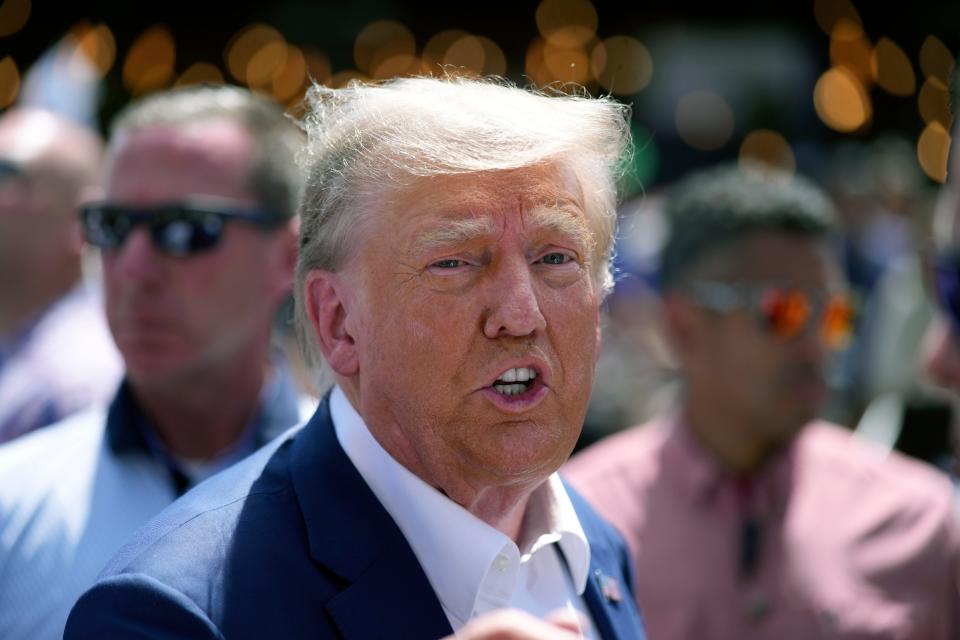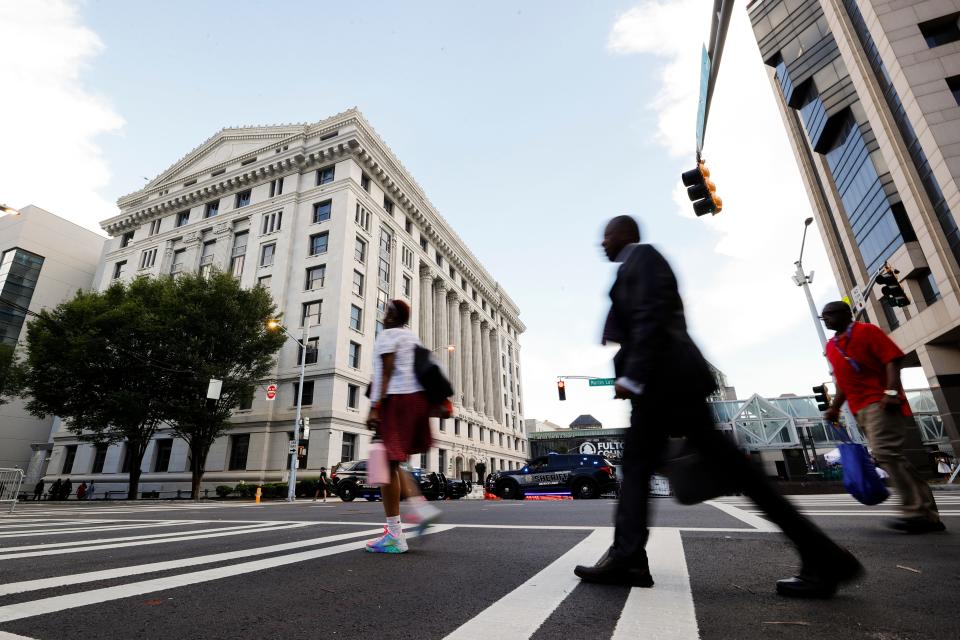Can Trump be pardoned in a state conviction? It’s possible. But in Georgia, it's complicated
- Oops!Something went wrong.Please try again later.
The unprecedented prospect of a criminal sentence for a former president – who could be reelected while cases against him proceed – is already raising questions about whether Donald Trump could end his own legal battles with a pardon or similar move.
In two federal criminal cases now pending, legal experts say, Trump could look to pardon himself if he retakes the presidency next year.
But Monday’s Georgia indictments are a different story. Convictions on state charges can’t be erased by a pardon, even from a reelected Trump – or by any other Trump ally who might win the White House.
“In Georgia, the issue is much more complicated,” said Anthony Michael Kreis, a law professor at Georgia State University.

For one reason, Kreis said, Georgia’s governor doesn’t hold the power to grant a pardon, unlike some other states. Instead, it rests with a state board not known for leniency, he said.
On Monday night, Fulton County District Attorney Fani Willis charged Trump and 18 others after a more than two-year investigation into an alleged criminal conspiracy to overturn its 2020 election results.
Trump faces five to 20 years in prison if convicted on Georgia racketeering charges. The other state-level charges Trump faces related to a hush-money payout in New York, by contrast, are less likely to result in any jail time, legal experts said.
Trump and his legal team are expected to try to move the state case to federal court. That has already been requested by Mark Meadows, Trump’s former chief of staff, who was also charged in the Fulton County indictment. According to documents filed in court Tuesday, Meadows’ attorneys argue that such a move is required in cases of state charges against a federal official while acting “under color" of their office.
Trump may also seek to delay all the cases until after the election just 15 months away.

A trial won’t necessarily stop his campaign. A state conviction does not bar a person from running for president. And if reelected, Trump could argue that a sitting president cannot face state charges while in office, experts said.
In any scenario, legal experts said, the nation finds itself in uncharted waters.
“The problem with all of this is that we don't really have precedent,” said Quinn Yeargain, a professor at Widener University Commonwealth Law School in Pennsylvania who studies state constitutional law. “We're relying on some very big ideas about federal power and executive power that were articulated a very long time ago, that did not directly relate to situations like this.”
RICO law: Trump charged in Georgia under law designed to nab Mafia bosses. What it means for case
Does Georgia governor have pardon power?
A constitutional amendment in the 1940s puts Georgia among just a handful of states whose governor does not have broad powers to issue pardons and commutations.
Instead, pardon power lies with the state's five-member Board of Paroles and Pardons, appointed by the governor and now led by Terry Barnard, a former Republican state legislator.

The board can grant a “regular” pardon five years after a sentence has been completed if the person has been crime-free, Board spokesman Steve Hayes told USA TODAY in an email. This rule has led some to speculate that a Trump conviction in Georgia would guarantee he would serve some kind of sentence.
But there may be other scenarios. Hayes said the board can commute a sentence to time served. It was not immediately clear what time restrictions, if any, would apply.
The body can also grant a “pardon of innocence” that does not require a five-year waiting period, though this is rare in the board’s 80-year history, said Hayes, who added that the board would not comment on “hypothetical situations.” That kind of pardon would require an investigation by the board, he said.
Kreis downplayed the likelihood the state would issue a pardon. “They're not built to forgive and to be lenient,” he said. “So it would be wildly out of historical practice for them. I just don’t see that as being in the cards.”
Some Republican legislators have called for changing the law to grant Georgia Gov. Brian Kemp – also a Republican – the authority to pardon Trump.
But it’s unclear whether even the Republican-led Legislature could muster support for such a change − or whether Kemp, who had overseen elections as a former secretary of state, would sign off, Yeargain said.
And in Georgia, Kreis said, there is no mechanism for "preemptive pardoning" as there is with presidential pardons. For example, President Gerald Ford pardoned Richard Nixon after Watergate, even though he had not been charged with a crime. In other cases, people charged with federal crimes have been pardoned after a conviction but before sentencing, such as when Trump pardoned former Maricopa County, Arizona, sheriff Joe Arpaio, according to the Justice Department.
In Georgia: Regardless of case against Trump, 2020 still casts a shadow over its elections
What about the federal indictments?
Yet Trump by contrast has a “good chance” of quashing his federal cases if he’s elected president, Kreis said.
“A president would have the power to order the dismissal of charges if they're still pending, or issue a pardon, or self-pardon, depending on the scenario, for either a conviction already rendered or to hedge against the prospect of a potential conviction,” he said.
Earlier this month in Washington, Trump pleaded not guilty on four counts related to alleged efforts to overturn the 2020 election, including conspiracy to defraud the United States. In July, Trump was arraigned on a separate case in Miami on federal charges of mishandling classified documents.
Still, those actions might spark legal battles that could put the case before the Supreme Court, Yeargain said. Unprecedented questions about criminal trials or sentences for a president-elect might end up presented to a court that now has a conservative majority, including three justices appointed by Trump.
Trump pardon list: Donald Trump granted clemency to 144 people in final hours
What about the indictment in New York?
Along with the federal cases, Trump was indicted in March on 34 felony counts by a Manhattan grand jury for allegedly falsifying business records in an attempt to conceal hush money payments − to adult film star Stormy Daniels and Playboy model Karen McDougal, who alleged they had sexual relations with Trump – before the 2016 election.
Some observers believe the case may not result in a jail sentence. But he could also face an uphill battle for a pardon in that state.
While New York’s governor has broad pardon authority, that prospect is likely a narrow one in a Democratic-led state and governor, Yeargain said.
What happens if Trump is elected while cases continue?
A crucial factor in how things unfurl will be the speed at which any trials take place.
Willis told reporters that she would like a trial date for the Trump case "within the next six months” and that she would like to try all 19 defendants together.
That’s an “extraordinarily ambitious timetable” given the complexity of the case, Kreis said, given Trump’s legal team must balance it against requirements that he appear in court in three other criminal proceedings.
Kreis also expects legal maneuvers by Trump's team, including seeking to move the case to federal courts.
Special counsel Jack Smith wants both federal case trials to start in the first half 2024. But they are not guaranteed to conclude by Election Day, Nov. 5.
After that, much of what happens next will depend on one thing: who wins, said Josh Chafetz, a law and politics professor at Georgetown University.
Trump, if elected, would likely argue that a sitting president cannot face state criminal charges while in office. That could mean the Georgia and New York cases would have to wait until he’s out of office, Kreis said.
And if Trump is convicted, jailed and then elected president? Kreis believes that Georgia might not be able to hold him. But, he cautioned, “we have never figured this out as a country because we've never had to.”
This article originally appeared on USA TODAY: Can Trump pardon himself? Can someone else? In Georgia, it's complex

